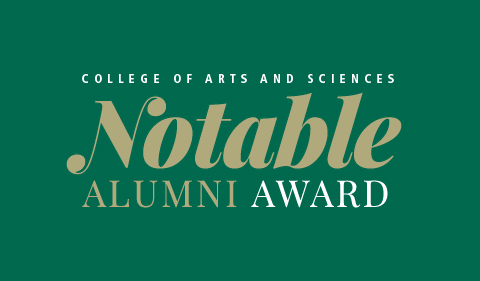
Editor’s Note: The College of Arts & Sciences launches the Notable Alumni Awards, honoring 37 Notable Alumni in 2017 for broad accomplishments in their careers, a commitment to community service, and valuable contributions to Ohio University, the College of Arts & Sciences, and its students.
Dr. Carolee T. Bull ’85 Plant Biology
Ohio University alum Dr. Carolee T. Bull is Professor of Bacterial Systematics & Plant Pathology at Pennsylvania State University.
She also is head of the of Plant Pathology and Environmental Microbiology Department and Interim Head of the Penn State Microbiome Center.
She earned a B.S. in Plant Biology (Cum Laude) from the College of Arts & Sciences at Ohio University in 1985.
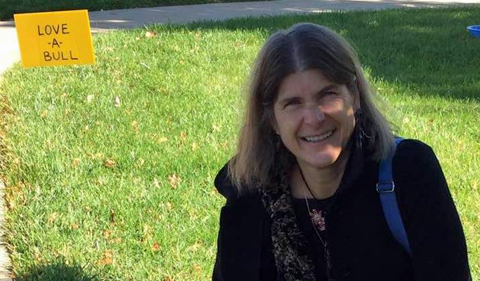
Dr. Carolee T. Bull
Bull arrived in Athens in Fall 1981 and quickly found family born to different parents. She had work-study positions in the Botany Department with Ivan Smith, James Cavender, and Phil Cantino.
She and her cohort started an undergraduate Botany club and enjoyed departmental seminars and parties.
Now, years later, Bull returned to campus in 2017 to give an academic lecture on her own research.
“I was a member of a strong group of friends who became family. We were a Leader, someone In Charge, a Boss, a teacher, a Divine Monarch, a Host, and a Wizard,” Bull says. “We spent lots of time in the stacks studying and bonded at Baker Center, dancing and sitting on the wall. From Halloween to May Fest, playing darts to hanging out in the caves, Calculus at 8 a.m. to O-chem, I learned to play as hard as I worked.”
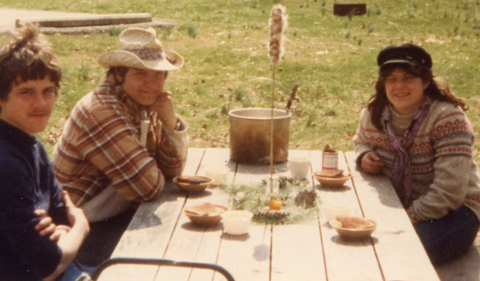
Bill Sphar, Scott Cotsmire, and Carolee Bull at Strouds Run on Easter Sunday 1982.
In 1984, she was recognized with the Botanical Society of America’s Young Botanist Recognition Award. She spent her summers working as a Girl Scouts camp counselor and as one of the first female commercial whitewater raft guides on the New River.
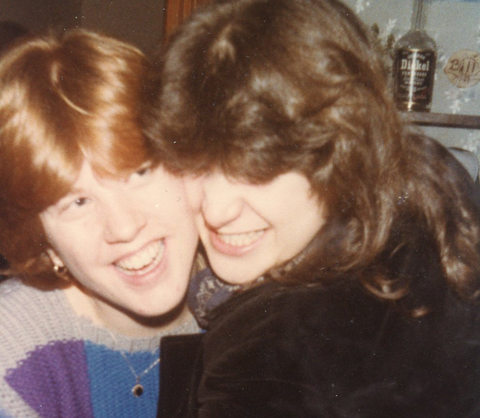
Bull and OHIO classmate Ann Struthers Sphar
“I am still close with my undergraduate friends Ann Struthers Sphar and Bill Sphar. I am hoping that this visit will forge new connections for me to OHIO and the department,” Bull says.
Off to Grad School
She took her scientific and rafting career to Washington State University, where she received the Nellie Townley Heald Scholarship for service to the department and graduated with an M.S. in Plant Pathology in 1987. She earned a Ph.D. from the Department of Botany and Plant Pathology at Oregon State University and in 1992, her final year, she received the College Agricultural Science’s Savoury Outstanding Graduate Student Award.
While obtaining her Ph.D., she worked for the Oregon State outdoor recreation center as a raft and climbing instructor and became a professional belly dancer. She continued her work on biological control of plant pathogens and phytobacteriology as a NSF postdoctoral Fellow at the Swiss Federal Institute of Technology in Zurich and the University of Lausanne, where she met her Swiss/French husband Jean-Philippe Fillettaz.
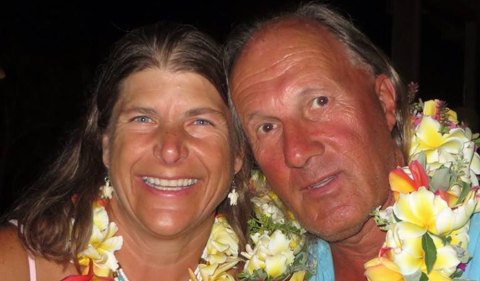
Carolee Bull and Jean-Philippe Fillettaz
About Bull’s Career
Bull joined the USDA Agricultural Research Service (ARS) in 1995. She trained many successful underrepresented undergraduate students (multiple NSF-Graduate Fellow winners) for careers in science and made it her singular goal to make the Salinas Valley (known as the Salad Bowl of the US) as well known for producing outstanding scientists as it is for growing lettuce.
Bull has received numerous awards for mentoring and readily shares her skills through workshops. In 2014, Bull received the Secretary’s Honor Award (the highest award for service to the nation in agriculture) from USDA Secretary Thomas Vilsack. Bull was key to the formation of an organic program in the USDA/ARS and served on the Administrative Council for the Western Sustainable Agriculture Research and Education Program. During her time in California, she added fitness instructor and wedding officiant to the list of her potential fall back careers.
Bull joined Penn State University on September 1, 2016 as a Professor of Systematic Bacteriology and Plant Pathology and serves as Head of the Department of Plant Pathology and Environmental Microbiology. Recently she led the initiative to develop the Penn State Microbiome Center, for which she is serving as the interim director.
Bull coined the term Translational Taxonomy to describe basic taxonomic inquiry that informs the development of applied disease management strategies. Her research integrated sequence-based methods into microbial species concepts and used molecular fingerprinting techniques to demonstrate the importance of pathogen and host diversity in disease epidemiology.
Bull tied these methods to a taxonomic framework to allow for rapid identification of bacterial plant pathogens. Using data from taxonomic inquiry, she developed host resistance, crop rotation, and biological control strategies for management of bacterial diseases of vegetables. Current funding has allowed her to research multitrophic interactions with the goal of developing management strategies for bacterial diseases in cultivated mushrooms.
Bull serves as the Convener of the International Society of Plant Pathology’s Committee on the Taxonomy since 2006, Secretary of the Judicial Commission of the International Committee on the Systematics of Prokaryotes and regularly presents workshops on bacterial taxonomy. Bull has held various leadership roles in the American Phytopathological Society.
Bull attributes her ability to run in many different directions at the same time to the support of her husband toward their common goals. He is the “human being” in their relationship, where she is the “human doing,” she says.
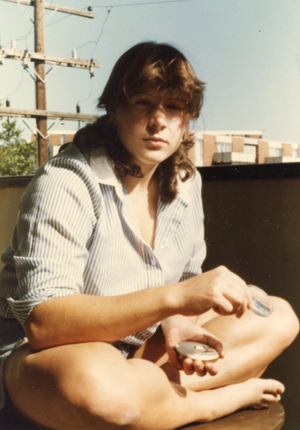
Bull using a magnifying glass to make a nametag for her friend, Bill
Ohio University Mentors
“Each made a difference with large and small efforts that they likely don’t even remember. Those efforts remind me to consciously invest in the students that I interact with. I especially appreciate those who held me accountable (Phil Cantino and John Mitchell). I started my relationship with systematics in the stacks, trying to understand Phil Cantino’s lecture on cladistics analysis. It is clear that my current research interests are inspired from what I learned in his class,” Bull says.
“I learned the basics of microbiology from Jim Cavendar and think of him when I train students to use an autoclave. The departmental staff and the department chair (Irwin Ungar) always at least pretended to be happy to see me. It was Larry Larson made me feel at home in an academic department and helped us start the Botany Club.”



















One Comment